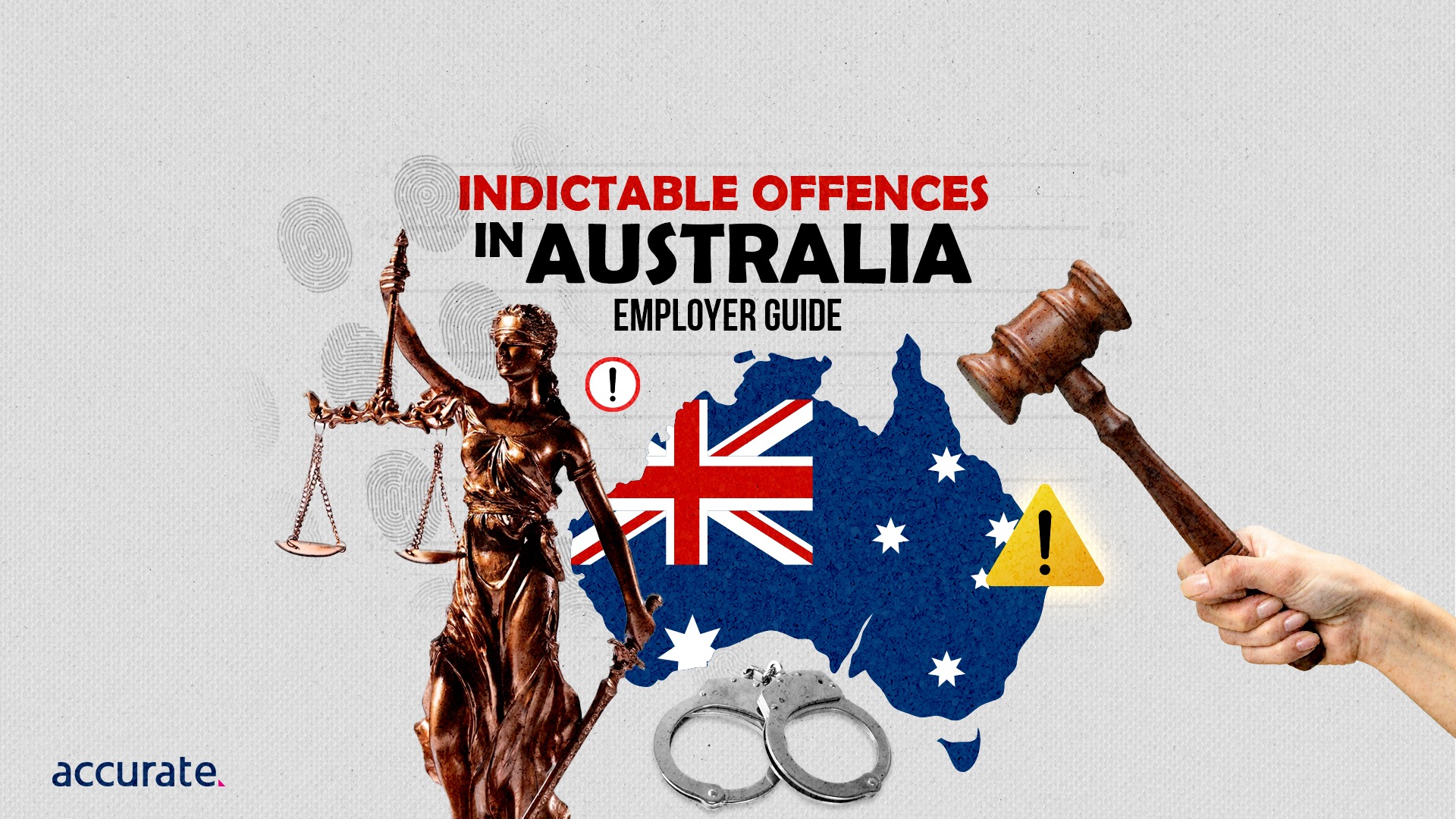Disclaimer: The contents of this article do not constitute legal advice, are not intended to be a substitute for legal advice and should not be relied upon as such. You should seek legal advice or other professional advice in relation to any issues you or your organisation may be facing.
The Australian legal system categorises criminal offences into three main types – summary offences, indictable offences, and strict liability offences.
Indictable offences are considered more serious and make up many of the offences on police checks and background screening results. If an individual is convicted, they can carry severe penalties and even jail time.
And with the prevalence of background checks and employment screening, indictable offences can have major implications for a person’s career prospects and livelihood.
Even after someone has served their sentence, relevant convictions on their record can pose barriers to gaining employment.
Here’s why.
Levels of Indictable Offences
In Australia, criminal offences fall into three main categories:
Summary Offences
Summary offences are minor crimes that are usually heard in a magistrates’ court. They are typically punishable by fines and do not carry a prison sentence. Common summary offences include minor assault, fare evasion, obstructing police, trespass, and public nuisance.
Simple Indictable Offences
If the defendant chooses, these crimes can still be heard summarily in a magistrate’s court. However, penalties may be higher if the prosecution decides to try the case as an indictment in a higher court.
Simple indictable offences carry a maximum penalty of 5 years imprisonment. Common examples include theft, fraud, common assault, sexual assault, low-level drug offences, property damage, and weapons charges.
Aggravated Indictable Offences
Aggravated, indictable offences are the most serious crimes. They must be tried in a higher court, and defendants do not have the option to hear the case summarily.
Aggravated indictable offences often involve violence, high-level drug charges, organised crime, bodily harm to victims, property loss, or breaches of duty of care. Maximum penalties range from 10 years to life in prison.
Examples include murder, manslaughter, aggravated sexual assault, armed robbery, commercial drug trafficking, and arson.
The Charges Process
If arrested and charged with an indictable offence, several phases leading up to final sentencing or penalty outcomes:
- Arrest and charges: Police can arrest and charge someone if they reasonably suspect that an indictable offence occurred. The arrestee is brought to a police station for questioning and formally charged.
- Court appearance: Those charged appear in court within days to weeks. A magistrate hears the charges and decides whether the person can await trial outside of custody on bail or remand. Defendants enter a guilty, not guilty or no plea at this stage.
- Bail: Depending on the offence, the defendant may await the trial outside of jail if the court grants bail. This involves paying money as a guarantee to attend future hearings. Bail is less likely for serious violent crimes or repeat offenders.
- Hearings and trial: For simple indictable matters, defendants choose whether to finalise the case summarily in a magistrates’ court or have a jury trial in a higher district or Supreme Court. Aggravated matters must go to the higher courts.
- Pleas and defences: The defendant enters a final plea once the prosecution presents its evidence. If pleading not guilty, defences aim to refute, justify or excuse the charges. Common defences to indictable offences include self-defence, duress, necessity, or insanity.
- Sentencing: If found guilty, the judge determines penalties guided by maximum terms set in legislation. Aggravating and mitigating circumstances also impact sentencing.
Indictable Offences and Background Checks
Given the gravity of crimes covered under indictable offences, these charges justifiably warrant consideration for certain purposes, such as employment screening and immigration. However, context is also essential.
Indictable offences will appear on national police checks, which may be required for jobs working with children, healthcare, finances or vulnerable groups. However, the detail and time frame covered vary between states.
Spent convictions legislation also limits reporting of certain historic convictions.
Employers must balance assessing potential risks with obligations under anti-discrimination laws. Blanket exclusions based solely on an indictable record could constitute unfair discrimination. For certain roles, some indictable offences may not reasonably impact suitability.
Instead, assess indictable offences individually, considering the nature of charges, ages of occurrences, penalties served, patterns of repeat offences, rehabilitation efforts, and the job relevance of convictions. Mitigating circumstances around self-defence and duress may also apply for certain assault changes.
Use information judiciously, not punitively, to make reasoned decisions aligned with occupational requirements. Consider supporting rehabilitation by valuing growth, restitution and remorse over permanent punishment for past crimes.
Key Takeaways
- Indictable offences are serious crimes that can impact employment suitability assessments. Charges range from theft to aggravated assault.
- Assess indictable charges individually rather than blanket exclusions to avoid unfair discrimination. Consider context such as timing, restitution made and job relevance.
- Focus evaluation on risks versus potential for rehabilitation rather than permanent punishment for past crimes.
Contact Us today to discuss your employment screening needs.
FAQs
What Is an Example of a Major Indictable Offence?
One example of a major indictable offence is aggravated sexual assault, which involves sexually assaulting someone while also intentionally or recklessly inflicting actual bodily harm. As an aggravated indictable offence, aggravated sexual assault is considered an extremely serious crime and must be tried in a higher District or Supreme Court before a judge and jury. Maximum penalties for aggravated sexual assault can potentially include life imprisonment, depending on the circumstances.
How Can Indictable Offences Be Heard?
In Australia’s legal system, indictable offences may be heard in two ways. Simple indictable offences give the defendant the option to finalise the matter summarily in a magistrates’ court or to elect a trial by jury in a higher district or supreme court.
However, aggravated indictable offences must always be tried in the higher courts as they are deemed the most serious crimes, such as murder, commercial drug trafficking and armed robbery. Defendants do not have the choice to have aggravated indictable matters heard in the usually faster and less complex Magistrates Court.
What Is the Meaning of the Word Indictable?
The term indictable means an offence is triable by a judge and jury in a higher court on an indictment, which is a formal document containing the charges. Indictable offences are considered more serious crimes than summary offences, which are typically heard by a magistrate alone in a lower court. An indictable offence holds the possibility of more severe sentences, such as longer terms of imprisonment. Defendants facing indictment are also afforded certain legal protections, given the increased complexity and potential penalties if convicted of indictable crimes.



